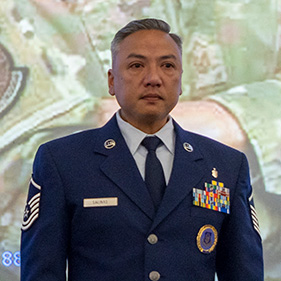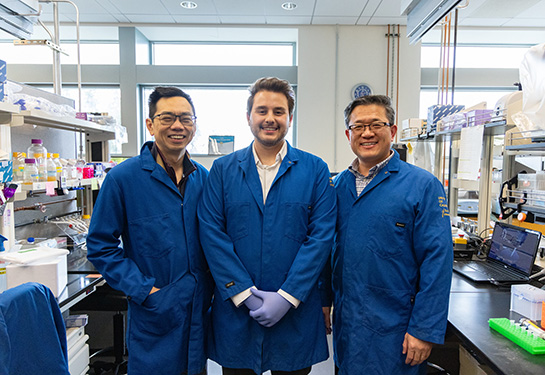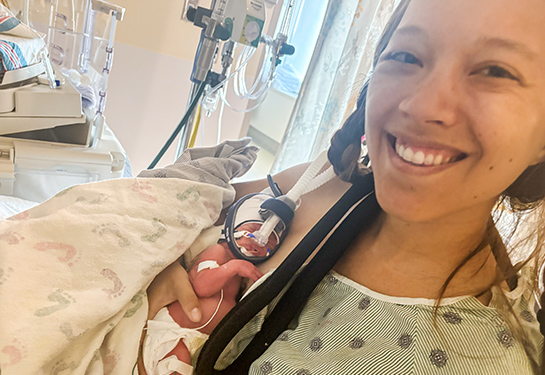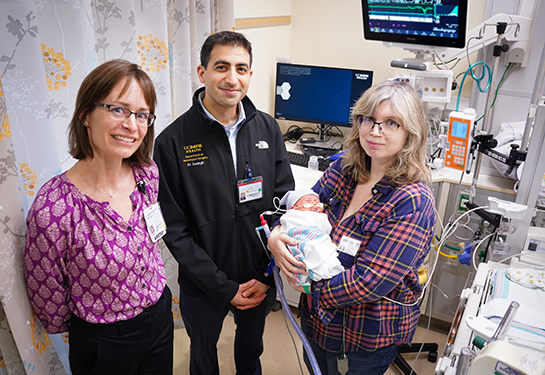Master Sgt. asks surgeon who saved his life to perform Air Force reenlistment ceremony
Surgeon and Lt. Col. Rachel Russo used techniques learned during combat to save Manny Salinas’ life.
After a string of emergency surgeries, Master Sgt. Manny Salinas’ return to work wasn’t even on the radar. But little did he know, nearly two years later he would return to the same medical center — this time, to recite his oath of reenlistment in the U.S. Air Force. Those in attendance were the very physicians who saved his life.
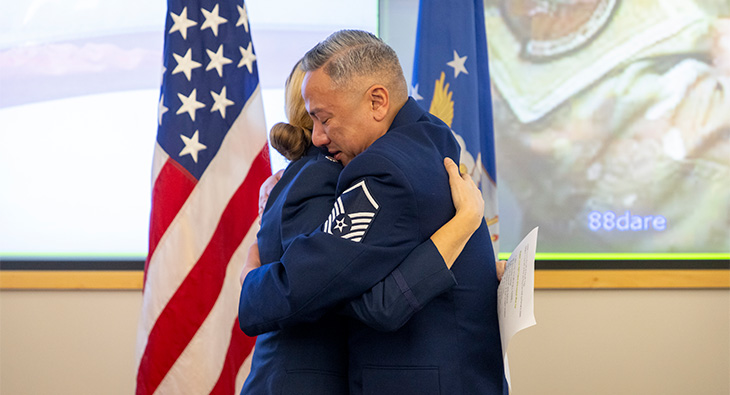
12 surgeries and a month-long coma
Much of Salinas’ hospital stay was a blur. He woke from a month-long coma in the corner room of the ICU, where long-term patients stay. The room was large, with bright windows.
He learned he had undergone 12 surgeries since being airlifted to UC Davis Medical Center for acute pancreatitis caused by hypertriglyceridemia, or high triglyceride levels, in March 2022. His surgeon Rachel Russo informed Salinas they’d had to remove his pancreas and part of his bowels, colon and other necrotic tissue in his abdomen.
Salinas probably wouldn’t be alive today if not for the first three emergency surgeries Russo performed in the ICU using skills she’d honed during combat.
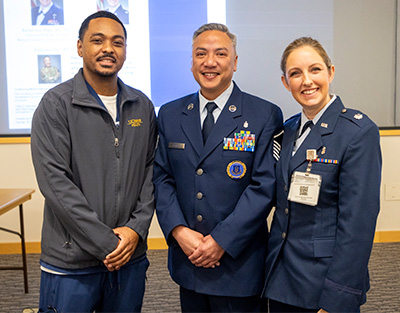
A lieutenant colonel in the U.S. Air Force and trauma surgeon for the 60th Medical Group at Travis Air Force Base, Russo happened to be the attending trauma surgeon in the Emergency Department when Salinas arrived that night. Russo, who works in the Division of Trauma, Acute Care Surgery and Surgical Critical Care, performed the first out-of-operating room surgery of her career, because her patient was too sick to be transferred to the OR.
It felt like fate. Salinas was also a member of the Air Force, where he worked as a recruiter. When he finally emerged from his coma, he found comfort in the care of a fellow servicemember and skilled physician.
A return to service
Over the months of additional surgeries, physical therapy and recovery that followed, Russo and the care team helped restore Salinas to health.
Finally, in spring of 2023, it was time to consider whether he would be able to return to work — that is, if the Air Force cleared him fit for duty.
Again, Russo stepped up. She wrote a letter recommending the military retain Salinas for active duty.
It worked. In May, the Medical Evaluation Board passed him. He got the news via FaceTime, just after he woke from his 13th surgery, the removal of his ostomy bag.
“That felt amazing. It all came to fruition with Dr. Russo, with her listening and helping me be retained,” Salinas said.
All that remained was the reenlistment ceremony and who would perform it, Salinas said. The first person who came to his mind was Lt. Col. Russo. Though he had to officially reenlist quickly, he and Russo were able to plan a second, ceremonial reenlistment ceremony at UC Davis Health.
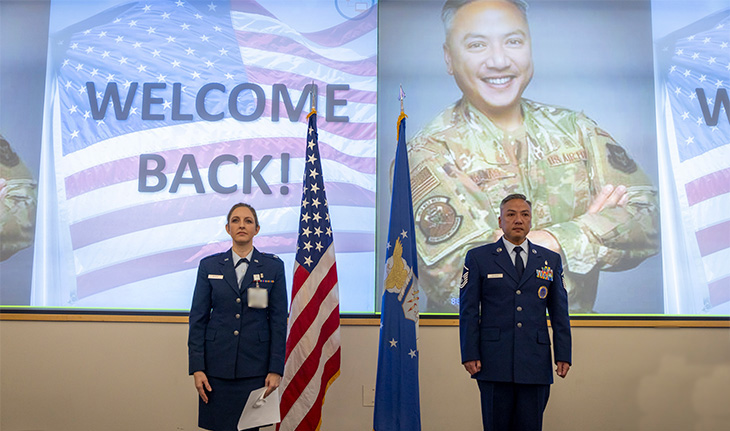
On Tuesday, Jan. 23, nearly two years after his hospitalization, in front of an audience of UC Davis Health clinicians and Air Force representatives, Salinas recited the oath of enlistment next to the American flag.
“[Dr. Russo] brought this hanky for me,” Salinas joked afterward during his remarks. He was overcome with emotion seeing photos of himself intubated and unconscious in the ICU, through recovery, and to this moment, surrounded by the physicians who saved him and fellow servicemembers. There was even a special guest. Surgical nurse Jermaine McLean realized partway through Salinas’ hospital stay that he grew up next door to his patient, when they both lived in Suisun, California.
Both Salinas and Russo also acknowledged Rachel Hight, the surgical intensivist during Salinas’ first emergency surgery and a retired Air Force colonel. “Thanks to Dr. Hight, I learned how to do my first bedside surgery,” said Russo, who considers Hight a mentor.
The team of surgeons involved in Salinas’s first 12 operations employed techniques honed during war, such as damage control surgery, negative pressure temporary abdominal closure and intestinal skin grafting.
They learned these skills as part of UC Davis Health’s military civilian partnership program with the U.S. Air Force and Travis Air Force Base. Now in its eighth year, the partnership is integral to the development of the Air Force medical corps. Because UC Davis Health is a level one trauma center, the hospital treats more critical conditions, not unlike injuries sustained during combat.
Go home, look in the mirror and remind yourself: You make a difference every day.”—Master Sgt. Manny Salinas
Time for gratitude
After an emotional ceremony, Salinas followed Russo to the ICU to visit the care team that restored him to health. Multiple nurses approached him with big smiles, pointing to the room where he spent most of his time.
Surgical nurse Morgan Rozecki rounded the corner, extending her arms for a big hug. “Thank you so much for coming back!” she said. “We don’t always get to see people after they’re discharged.”
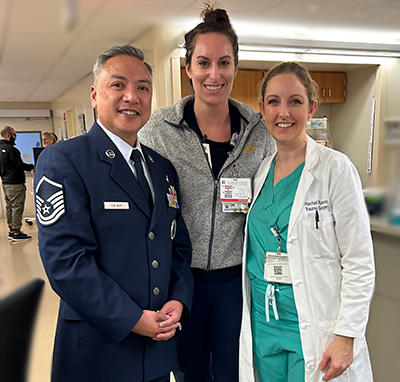
Salinas expressed his gratitude to her and the team. “Go home, look in the mirror and remind yourself: You make a difference every day,” he said.
He walked back downstairs to the first floor and chose a chair outdoors in the hospital’s café courtyard. In uniform, his posture appeared solid and composed; in reality, he still experiences constant pain. His abdomen will be healing for many months to come. Until then, he works part-time, on a hybrid telework schedule.
And without a pancreas, he will have type 1 diabetes for the rest of his life. “But that sure as hell beats being below ground,” he shrugged. “If I can be six feet above ground and have to take insulin every day, I’ll take that over being dead.”
As an Air Force recruiter, Salinas plans to share his experience so fighters know the world’s best medical care is behind them if they get injured. He hopes it will help provide extra confidence if they go to battle.
With his reenlistment, Salinas will be able to complete the final few years required to earn 20 years of military service and a full, non-medical retirement.

